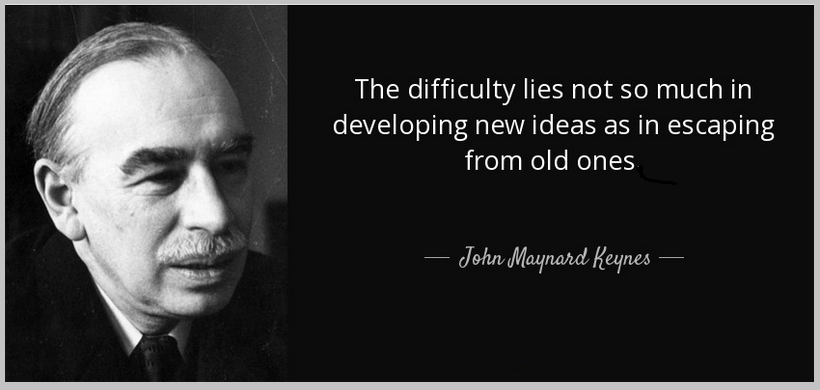
Geoffrey M. Hodgson
Many people still call themselves socialists. But rarely is it made clear what they mean by the description. Few seem aware of its original definition, which persisted from the 1830s to the 1950s. Some will argue that the word has acquired a new meaning since then. Words do change their meanings. But there is no consensus on what that new meaning is.
Despite its idealistic connotations of purity and principle, the word socialism hangs around the neck of left parties. It serves as an invitation for infiltration by Marxists and others, who may enter any party proclaiming their “democratic socialism” or their “socialist principles”.
Having being invited by the s-word, they simply have to point to its original meaning to justify their maximalist stances on class struggle and public ownership. The retention of the s-word will always feed the hard left.
Owenites and Marxists
The term socialist emerged in English for the first time in 1827 in the Co-operative Magazine, which was published in London by followers of Robert Owen. It moved into wider usage in the 1830s. For Owen and his followers, socialism meant the abolition of private property. It also acquired the broader ideological connotation of cooperation, in opposition to selfish individualism.
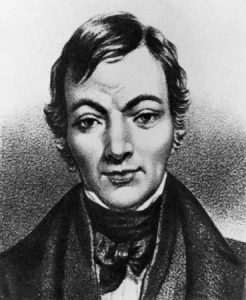
Robert Owen
As Owen argued in 1840, “virtue and happiness could never be attained” in “any system in which private property was admitted”. He aimed to secure “an equality of wealth and rank, by merging all private into public property”.
Owen and his followers attempted to establish several socialist communities in the UK and USA. All failed within a few years. The young Frederick Engels attended an Owenite meeting in Manchester in 1843, and was inspired by Owen’s notion of socialism.
Marx and Engels wanted the complete abolition of the “free selling and buying” of commodities. They advocated common ownership of all means of production and the abolition of commodity exchange and markets.
Hence, from the 1830s until the 1950s, socialism was almost universally defined in terms of the abolition or minimisation of private property and some form of widespread common ownership.
Statist socialism
Marx and Engels insisted that markets should be abolished and all means of production should be placed in the hands of the state.
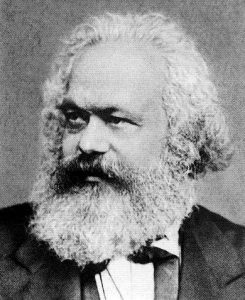
Karl Marx
Marx and Engels often used the term communism instead of socialism. But this was primarily to distance themselves from the naïve ideas of contemporary socialists rather than to postulate a radically different objective. For them, communism was a label for their movement, rather than their goal. Thus in 1845 they wrote:
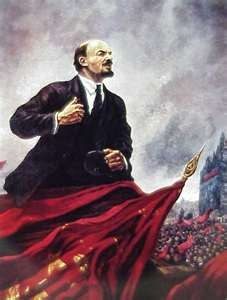 Sometimes, as in his Critique of the Gotha Programme of 1875, Marx referred to the “lower” and “higher phases” of communism, instead of socialism.
Sometimes, as in his Critique of the Gotha Programme of 1875, Marx referred to the “lower” and “higher phases” of communism, instead of socialism.
In 1917 Vladimir Ilych Lenin was writing his State and Revolution, on the eve of the Bolshevik seizure of power. Some left critics had argued that Russia was insufficiently developed for socialist revolution.
So Lenin redefined socialism as a transitional stage (still involving extensive state ownership) between capitalism and communism.
By contrast, Marx and Engels did not use the term socialism to refer to a future stage between capitalism and communism. Their aim was described interchangeably as socialism or communism.
French lessons
Engels’ description of Charles Fourier and Claude-Henri de Saint-Simon as “utopian socialists” is inaccurate because – unlike Owen – they supported private ownership of the means of production. They imagined harmonious communities without poverty or strife. But some of Saint-Simon’s followers moved toward socialism.
Philippe Buchez was inspired by Saint-Simon. He promoted worker cooperatives as early as 1831, and his ideas became prominent during the French Revolution of 1848.
Contrary to most of his contemporary socialists and communists, Buchez and his followers eventually recognized the need for multiple, autonomous, worker co-operatives, each owning property and engaging in contracts and markets.
But this tolerance of markets was too much for Marx. In 1875 he described Buchez’s ideas as “reactionary”, “sectarian”, opposed to the workers’ “class movement”, and contrary to the true revolutionary aim of “cooperative production … on a national scale”.
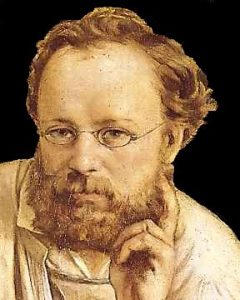
Pierre Joseph Proudhon
In 1840 Pierre Joseph Proudhon published his What is Property? He used both socialism and anarchism to describe his proposed future society. But, like Buchez, Proudhon proposed a system of worker cooperatives linked by contracts and trade. This enraged Marx and Engels, who relentlessly attached Proudhon’s ideas.
Non-statist versions of socialism endured but were overshadowed by statist variants. From the 1870s to the 1950s the dominant view of socialism involved state ownership and control. To emphasise their dissent, Proudhon and other opponents of statist socialism often described themselves as anarchists.
Fabianism
The idea that private property and markets should be abolished was thematic to socialism and unconfined to Marxism. It pervaded the writings of socialists as diverse as Continental revolutionary communists and British Fabians. At least until the 1950s, hostility towards markets and private property were thematic for socialism as a whole. The founding influences of Owen and Marx were long-lasting.
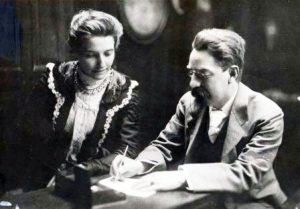
Beatrice & Sidney Webb
Drafted by leading Fabians Sidney and Beatrice Webb, Clause Four, Part Four of the Labour Party Constitution encapsulated collectivist thinking when it was adopted in 1918:
“To secure for the workers by hand or by brain the full fruits of their industry and the most equitable distribution thereof that may be possible upon the basis of the common ownership of the means of production, distribution and exchange, and the best obtainable system of popular administration and control of each industry or service.”
This provided for no exception: all production would be in common ownership and there would be no private sector. Although some Labour Party thinkers began to entertain the possibility of some private enterprise, many party members remained resolutely in support of widespread common ownership.
Some Fabian socialists tried to lay out more detail on how socialism would work. The Webbs laid out their ultimate vision of a fully planned and consciously controlled socialist economy where all markets and private ownership of the means of production had been marginalized to insignificance. They wanted private ownership of the means of production to be ended: it was a “perversion”.
They envisaged a massive, complex structure of national, regional and local committees, all involved in decision-making over details of production and distribution. How would these cope with the huge amounts of information and specialized knowledge in modern complex economies? It was simply assumed that this was relatively easy to sort out in some rational manner.
Guild socialism
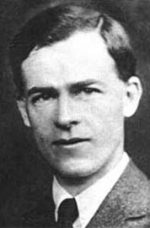
G D H Cole
The British Fabian G. D. H. Cole is sometimes described as a “libertarian socialist” and as an advocate of “decentralized” or “guild” socialism. But he supported the wholesale nationalisation of industry and the abolition of private enterprise. To his great credit, and unlike most Marxists, Cole did actually try to explain how a future socialist society would work. But his explanation is a failure.
Cole did not show how devolved democracy could function and endure in a society where private property was abolished. His hyper-democratic account of socialism, where individuals make decisions throughout industry as well as the polity, failed to consider the problems of necessary skill in judgment, of obtaining relevant knowledge, and the overwhelming number of meetings and decisions involved.
Cole’s vision of socialism was of an integrated, national system where “a single authority is responsible both for the planning of the social production as a whole and for the distribution of the incomes which will be used in buying it.” Within this “single authority” he also sought devolved worker control. He wanted local autonomy of manufacturing, modelled on the medieval guild.
But Cole was tragically unclear about how the two were to be reconciled. How would the autonomous powers of the latter be protected from the control and centralizing ambitions of the “single authority”? There was no adequate answer. His whole system was unworkable.
Clement Attlee and Bertrand Russell
In 1937, eight years before he became UK Prime Minister, Clement Attlee wrote of the “evils” of capitalism: their “cause is the private ownership of the means of life; the remedy is public ownership.” Attlee then approvingly quoted the words of Bertrand Russell:
“Socialism means the common ownership of land and capital together with a democratic form of government. … It involves the abolition of all unearned wealth and of all private control over the means of livelihood of the workers”.
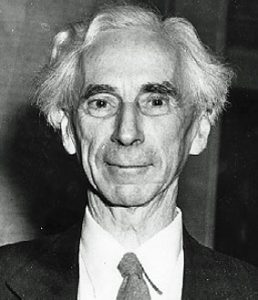
Bertrand Russell
Even within the moderate and non-Marxist Labour Party, the word socialism endured with these collectivist connotations, posed in opposition to private firms, competition and markets.
Russell represented an important strain of thinking within the British left. He wholeheartedly supported the notion of a publicly-owned and planned economy, but he rejected “Bolshevik methods”.
But is it possible to promote a state monopoly of economic power, while preventing a central-state monopoly and potential despotism of political power? In no historical case has the first happened and the second been prevented. Statist socialism, with viable democracy, political pluralism and effective decentralisation, exits only in the imagination of impractical idealists.
‘Market socialism’?
In the 1930s the economist Oskar Lange and others claimed that mainstream economic theory can show how socialism could work. Lange and his co-workers argued that managers of firms should be instructed to expand production until marginal costs were equal to the declared market price of the product.
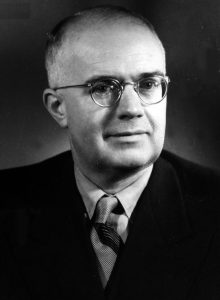
Oskar Lange
But this assumed that marginal costs could be calculated and that the central planners could smoothly and readily assess whether there were surpluses or shortages, and adjust prices accordingly. Lange and others wrongly assumed that such information was readily available.
These proposals for “market socialism” attempted to simulate markets within a planning system, rather than to establish true markets with private ownership and commodity exchange. There was no private ownership and no capacity for firms to make contracts. The models developed by Lange and his collaborators involved a high degree of centralised co-ordination that excluded any real-world market.
Significantly, no attempt has ever been made to implement a Lange-type model in reality. Lange himself made no effort to persuade the post-1945 “socialist” government in his native Poland of the value of the idea.
Hence the use of the term “market socialism” in this context is highly misleading. Unlike the proposals of Buchez or Proudhon, and unlike the system of worker cooperatives established under Josip Tito in Yugoslavia after the Second World War, Lange’s proposal did not involve true markets.
Post-war revisionism
In 1956 C. Anthony Crosland published The Future of Socialism. This began Labour’s slow reconciliation with markets, private enterprise and a mixed economy. Signalling an attempted shift of meaning, Crosland argued that the central aim of socialism was not necessarily common ownership, but social justice and economic equality, and these could be achieved by different means. But although his argument was highly influential, it was widely attacked within the Labour Party and elsewhere.
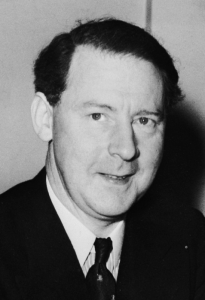
Hugh Gaitskell
In 1959 the (West) German Social Democratic Party abandoned the goal of widespread common ownership. In the same year, Hugh Gaitskell tried to get the British Labour Party to follow this lead, but met stiff resistance. The party did not ditch its Clause Four commitment to the complete “common ownership of the means of production, distribution and exchange” until 1995.
Richard Toye noted that the Labour Party assumed widespread public ownership and failed to develop adequate policies concerning the private sector:
“Labour, until at least the 1950s, showed little interest in developing policies for the private sector. During the 1960s, the party demonstrated continuing ambiguity about whether or not competition was a good thing. This ambiguity continued at least until the 1980s.”
Tony Blair and New Labour
But in 1995, after 77 years, Labour’s Clause Four was changed. Tony Blair successfully ended the Labour Party’s longstanding constitutional commitment to far-reaching common ownership. But this was not without opposition. Tony Benn protested: “Labour’s heart is being cut out”.
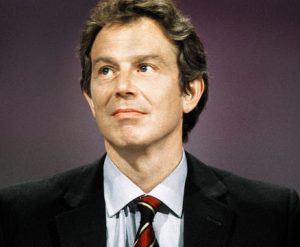
Tony Blair
The new wording of “Clause IV: Aims and Values” declared that: “The Labour Party is a democratic socialist party.” But the clause ceased to promote unalloyed common ownership and the full text admitted a positive role for markets and a private sector.
By contrast, the 1918 formulation did not use the word socialism – it had undiluted common ownership instead.
Blair introduced the word socialism in 1995, but he attempted to change its meaning. He promoted “social-ism”, which now meant recognizing individuals as socially interdependent. It also signalled social justice, cohesion and equality of opportunity, within a mixed economy involving both private and public ownership.
Hence, instead of tackling the problem of Labour’s old collectivist DNA more directly, Blair tried to change the meaning of socialism and to airbrush Labour’s history. He failed to promote an adequate alternative vision or philosophy within Labour to replace old-fashioned common ownership. To the traditional left, it appeared as the substitution of purity and socialist principle by fudge and capitalist compromise.
But oddly Blair was responsible for the explicit insertion of socialism in its aims. This inadvertently played into the hands of the party’s enduring, backward-looking left.
Learning no lessons
Blair’s invasion of Iraq in 2003 and the financial crash of 2008 helped to turn the Labour membership against Blair and his compromises with capitalism. As evidence of the Freudian defence mechanism of regression as a response to severe stress, Labour reverted to an earlier stage of its history, re-adopting its infant ideological comforts of collectivism and state control.
The ghost of Tony Benn emerged. His Campaign Group in parliament moved from the margins to the party mainstream.
Like Benn, the current leadership of the UK Labour Party shows little awareness of the chronic problems of managing a modern, complex, centrally-planned economy. They now accept a “mixed economy” as a transition stage, but fail to promote the virtues or enduring role of the private sector.
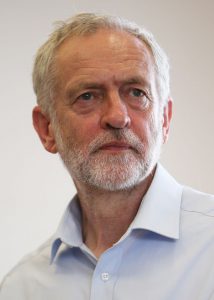
Jeremy Corbyn
To take one example, Jeremy Corbyn’s 2015 address to the UK Co-operative Party is overwhelming in its blandness and naivety. Therein Corby shows no awareness that viable and meaningful decentralisation of economic power must involve (cooperative or other) firms with the right to own, set prices for, and trade their outputs. He rightly mentions the virtues of worker and consumer participation in decision-making, but shows no awareness of the practical limits of such participation.
Corbyn simply waved the magic wand of “democracy” without any apparent appreciation that it is impossible to involve everyone in more than a tiny fraction of all the complex decisions involved in any modern economy. Corbyn showed no awareness of the practical problems of complex decision-making in large organisations, which are dependent on multiple, localised, skills and expertise.
Withering socialism
Following Labour’s advances in the 2017 general election, the leadership of Corbyn and his allies seems entrenched. Recently they have gained control of the powerful National Executive Committee of the party. For future nominations for the Labour leadership or deputy leadership, it is probable that the 15 per cent threshold of support from Labour MPs will be lowered, making ongoing hard left prominence more likely.
In the 1980s and 1990s the hard left were pushed back with the help of large, moderate trade unions that were affiliated to Labour. Those countervailing forces have gone. The unions are smaller and some are more inclined to the hard left.
 With the Brexit vote in 2016, Britain has entered its most dangerous political crisis since the Second World War. The country is governed by an inept Conservative Party that is tearing up the UK constitution and concentrating unprecedented power in the hands of its duplicitous ministers.
With the Brexit vote in 2016, Britain has entered its most dangerous political crisis since the Second World War. The country is governed by an inept Conservative Party that is tearing up the UK constitution and concentrating unprecedented power in the hands of its duplicitous ministers.
Labour’s 2017 electoral advances were partly due to Tory incompetence. In this volatile climate it is possible that Corbyn could soon become prime minister. Subsequently, an obvious danger would be that the concentration of executive power legislated by Tory opponents would prove too tempting for Labour in power to relinquish. After growing authoritarianism from the reactionary right, we might experience a new, collectivist authoritarianism from Labour.
A Labour government committed to dealing with the severe crises in the health, education and housing sectors can bring positive benefits. Substantial state intervention is needed to regulate markets, especially in the area of finance. But such a programme needs to be tempered by heavy measures of pragmatism, pluralism, cautious experimentation and ideological humility that are alien to the current leadership.
They show no sign that they have abandoned their old, statist socialism. There is no recognition that markets and substantial private enterprise are necessary to sustain autonomy and decentralisation. As has become apparent in Corbyn’s favourite socialist experiment in Venezuela, the road to hell is paved with good intentions.
Conclusion – More French lessons
However outdated, it is difficult to dislodge the core principles upon which any party is founded. France provides an important illustration. Michel Rocard was a leading member of the French Socialist Party and a prime minister under François Mitterand. He long argued that French socialists

Emmanuel Macron
had failed to modernise and to accept the enduring importance of private property and markets.
Emmanuel Macron was a protégée of Rocard. Macron gained presidential power after breaking from the fractured Socialist Party and building a powerful centre force. Perhaps there are some lessons for progressives in Britain. It would not be the first time that the French have shown us the way forward.
13 September 2017
Minor edits: 16, 21 September 2017
This book elaborates on some of the political issues raised in this blog:
Published by University of Chicago Press in January 2018
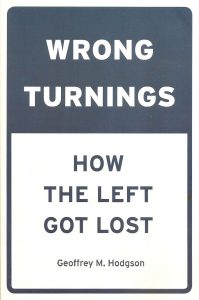
Bibliography
Attlee, Clement R. (1937) The Labour Party in Perspective (London: Gollancz).
Bestor, Arthur E., Jr (1948) ‘The Evolution of the Socialist Vocabulary’, Journal of the History of Ideas, 9(3), June, pp. 259-302.
Blair, Tony (1994) Socialism, Fabian Pamphlet 565 (London: Fabian Society).
Cole, George D. H. (1920) Guild Socialism Re-Stated (London: Parsons).
Crosland, C. Anthony R. (1956) The Future of Socialism (London: Jonathan Cape).
Harrison, J. F. C. (1969) Robert Owen and the Owenites in Britain and America (London: Routledge and Kegan Paul).
Hodgson, Geoffrey M. (2017) Wrong Turnings: How the Left Got Lost (Chicago: University of Chicago Press, forthcoming).
Owen, Robert (1991) A New View of Society and Other Writings (Harmondsworth: Penguin).
Landauer, Carl A. (1959) European Socialism: A History of Ideas and Movements from the Industrial Revolution to Hitler’s Seizure of Power, 2 vols. (Berkeley: University of California Press).
Lange, Oskar R. and Taylor, Frederick M. (1938) On the Economic Theory of Socialism (Minneapolis: University of Minnesota Press).
Proudhon, Pierre Joseph (1890) What is Property?: An Inquiry into the Principle of Right and Government, translated from the French edition of 1840 (New York: Humbold).
Russell, Bertrand (1920) The Practice and Theory of Bolshevism (London: George Allen and Unwin).
Steele, David Ramsay (1992) From Marx to Mises: Post-Capitalist Society and the Challenge of Economic Calculation (La Salle, Illinois: Open Court).
Toye, Richard (2004) ‘The Smallest Party in History’? New Labour in Historical Perspective’, Labour History Review, 69(1), April, pp. 83-104.
Webb, Sidney J. and Webb, Beatrice (1920) A Constitution for the Socialist Commonwealth of Great Britain (London: Longmans Green).



 Sometimes, as in his Critique of the Gotha Programme of 1875, Marx referred to the “lower” and “higher phases” of communism, instead of socialism.
Sometimes, as in his Critique of the Gotha Programme of 1875, Marx referred to the “lower” and “higher phases” of communism, instead of socialism. 







 With the Brexit vote in 2016, Britain has entered its most dangerous political crisis since the Second World War. The country is governed by an inept Conservative Party that is tearing up the UK constitution and concentrating unprecedented power in the hands of its duplicitous ministers.
With the Brexit vote in 2016, Britain has entered its most dangerous political crisis since the Second World War. The country is governed by an inept Conservative Party that is tearing up the UK constitution and concentrating unprecedented power in the hands of its duplicitous ministers.

Pingback: Socialism has invaded the moral high ground – New Politics